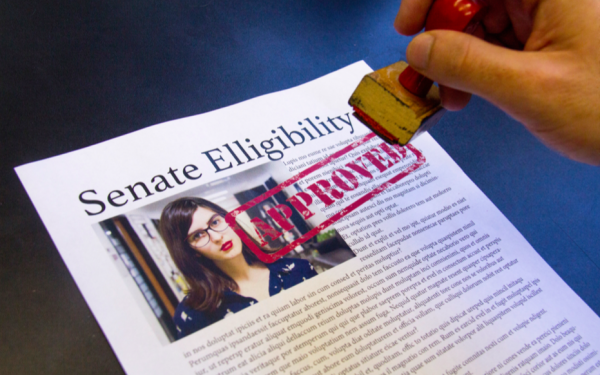CSU General Coordinator Prohibited From Sitting on Senate
The New Committee May Challenge the Eligibility Requirements for Students
The Concordia Student Union General Coordinator Sophie Hough-Martin is not eligible to sit on Concordia’s Senate or Board of Governors due to being on conditional standing, as a result of low grades.
Had she not been barred, Hough-Martin would have sat as Ex-Officio on Senate, part of her role as general coordinator.
However, an ad hoc committee suggested by the CSU was approved at Senate on Friday and could challenge the Senate’s regulations.
According to Concordia’s by-laws, students elected to Senate must be in acceptable academic standing.
Those stuck in conditional standing, a grade point average between 1.50 and 1.99, get barred.
The majority of Senate voted in favour of the ad hoc committee, which will review the eligibility requirements of students who want to sit on Senate but have conditional standing.
Hough-Martin said the university’s regulations are in conflict with Quebec’s Accreditation Act, since the act gives student associations the privilege to appoint students as student representatives in university bodies.
“It’s in the administration’s opinion that [the Accreditation Act] doesn’t say they can’t put reasonable limitations on appointing students—you can choose the student as long as they abide by [the Universities] rules,” said Hough-Martin.
_The Link _ reached out to the university for comment, but didn’t receive a response before publishing.
Hough-Martin said this ad hoc committee doesn’t plan to challenge Senate’s by-laws, but rather will aim to ensure students with conditional standing can have the opportunity to have exceptions made for them.
Hough-Martin said the rules on conditional standing are flawed because students can have a GPA above 2.0 but still be on conditional standing.
“The fact that the university is getting away with imposing these extra barriers, really to my sense and to other students as well—we don’t see how that is even legally an option for the university.”
—Marion Miller
“Acceptable academic standing is not based on your overall GPA, its based on your last assessment period, so its the last three semesters from the previous academic year,” she said.
“I am very open about my struggles with mental illness,” said Hough Martin. “I had a major depressive episode in fall of 2017 that resulted in a poor academic performance, and as a result I am currently in conditional standing.”
She said her accumulative GPA is 2.77, while her assessment period GPA is 1.9, keeping her stuck in conditional standing.
At the last Senate meeting on Sept. 14, requests from the CSU to not bar Hough-Martin were denied.
“I filed incompletes, I paid $75 for the three courses to get incomplete notations, but you have to submit all your course work by Feb. 15 for the incomplete notation,” she said.
“Unfortunately due to the nature of my mental illness it was not possible for me to hand in all the coursework by the incomplete deadline,” said Hough-Martin.
She ended up failing three classes in the winter. Through in the spring and summer semesters, Hough-Martin said her grades raised significantly.
“Despite the good grades I had on my transcript, they didn’t cancel out the bad grades I had.”
She said she’s still in the process of trying to request other notations to fix her failed classes. Hough-Martin said her situation relates to a larger situation facing many students.
“It’s discriminatory when you think of the many situations that can lead to a student being on unconditional standing,” she said. “We’re really hopeful that this will lead to a productive discussion and that conditional standing students will no longer be excluded from sitting on university bodies.”
A similar ad hoc committee was called in 2016 to review the eligibility of students with sanctions under the university’s academic code of conduct and code of rights and responsibilities.
That happened after two students on Senate were barred from taking their seats as student Senators due to letters of reprimand they received in 2016 after protesting against austerity measures in the spring of 2015.
At the time, then-Senate fine arts representative Marion Miller and then-CSU General Coordinator Lucinda Marshall-Kiparissis received letters of reprimand.
“The fact that the university is getting away with imposing these extra barriers, really to my sense and to other students as well—we don’t see how that is even legally an option for the university,” said Miller in a recent interview with The Link.
As a result of the recommendation made by a 2016 ad hoc committee, Senate changed the eligibility to allow students with these sanctions to sitting on Senate in Fall of 2016.
Miller said at that time those barred from Senate and those involved in the committee hoped future students would keep pushing to remove the requirements of academic standing and to push for independent students to be able to sit on senate, but barriers still exist today.
Hough-Martin said there are also plans to push for something similar with the Board of Governors.
With files from Miriam Lafontaine






webedit_600_375_90_s_c1.jpg)
_600_375_90_s_c1.jpg)